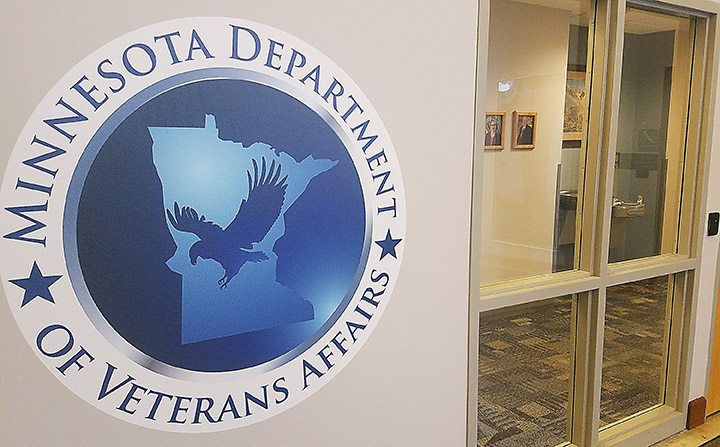
ST. PAUL — The Minnesota Department of Veterans Affairs has been forming its legislative initiatives for the 2020 session. Opening day of the session is Feb. 11, and Veterans Day on the Hill is slated for April 20.
The MDVA plans to ask the state Legislature to:
• Allow the commissioner of veteran affairs, and by extension certain staff members, to use data from the homeless veteran registry to help homeless veterans secure housing. This measure could be controversial in light of the sensitive nature of data privacy. It should be noted veterans grant the waiver when signing the homeless registry, and the agency on a regular basis helps them find housing they often cannot otherwise find themselves in a market of rising rents. The Minnesota Coalition for the Homeless is seeking the same authorization for homeless people it helps find housing.
• Expand veterans courts so they are available statewide. The notion of veterans courts actually is a diversion program for veterans facing criminal charges for behavior that can be connected to their time in service, typically combat. A judge can withhold a plea and assign help. If the veteran meets the court’s requirements, the judge can tear up the charges. Minnesota was a pioneer of veterans courts in 2008 and presently has the program in some districts but not all. Chief Justice Lorie Gildea has spoken in favor of expansion.
• Fund $1 million in fiscal biennium 2020-21 and $1.2 million in 2022-23 for preventing suicide among veterans. The MDVA would like to hire a coordinator and liaison with the goal of developing a model for suicide prevention efforts and for better understanding the gaps in Minnesota — such as how some counties have low rates and some have high rates. The agency would work in line with the federal VA suicide-prevention efforts, too.
• Fund $3.17 million in 2020-21 and $6.33 million in 2022-23 to fund 150 housing vouchers for veterans who do not qualify for the HUD-VASH vouchers. HUD-VASH is a federal rental-assistance program to help homeless veterans and their families gain housing. It is operated collaboratively through the U.S. Department of Housing and Urban Development and the U.S. Department of Veterans Affairs.
• Fund $4.2 million via bonding for improving the safety and security of the veterans homes in Luverne, Silver Bay, Hastings and Fergus Falls, such as electronic locks, among other upgrades. The Legislature typically passes a bonding bill (aka capital-investments bill) in its even-numbered years.
• Fund $10.7 million via bonding for asset preservation. The MDVA regularly requests bonding-bill assistance with maintaining its 64 buildings, altogether valued around $311 million. Nine of them are residences for veterans.
• Fund $100,000 via bonding for a greenhouse at the Fergus Falls Veterans Home. The residents living there already have raised nearly $100,000 for the project.
• Permit the MDVA to employ a public relations agency. Because of the distance between St. Paul and four of the five homes it operates, the MDVA would like to rely on local agencies for community relations. A PR person in, say, Silver Bay knows the local media and service clubs better than one in the Twin Cities.
• Clarify language in the Minnesota G.I. Bill. The bill as it stands offers payment to veterans for three types of educational expenses: for college tuition, for career apprenticeships and for licenses and certifications. The new language clarifies eligibility for each component to avoid confusing the three or misuse of the three.
• Authorize the MDVA to hire dental staff directly. Presently, the agency can only contract for dental care of veterans in the veterans homes.
• Authorize the MDVA to operate adult day care. The agency presently offers adult day care at its Minneapolis campus, but this measure is a technical correction that provides more specific language than it presently has.